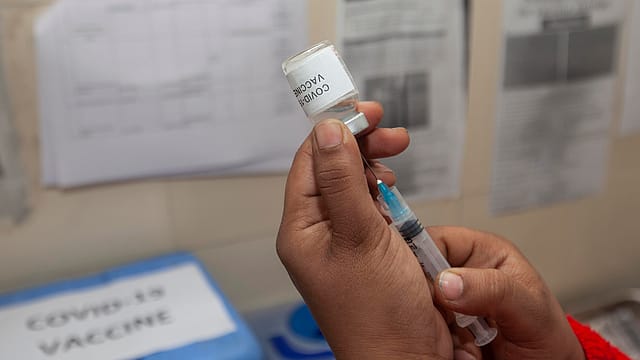Covid-19 booster dose free for 18-59 age group from July 15
ADVERTISEMENT

Union minister Anurag Thakur on Wednesday said the government will provide free Covid-19 precaution doses for 18-59 age group at state-run vaccination centres from July 15.
The free Covid-19 booster dose will be part of a special drive that will continue for 75 days, starting Friday. The special drive is part of the government's Azadi Ka Amrit Mahotsav campaign to celebrate 75th anniversary of India's independence.
"India is celebrating 75 years of independence. On the occasion of Azadi ka Amrit Kaal, it has been decided that from July 15, 2022 till the next 75 days, citizens above 18 years of age will be given booster doses free of cost," Thakur said in a press briefing after the Union Cabinet meeting on Wednesday.
Less than 1% of the target population of 77 crore in the 18-59 age group have been administered the precaution dose so far.
About 5.10 crore precaution doses have been administered so far. These include 2.67 crore booster doses received by senior citizens as on Wednesday. About 1.11 crore precaution doses have been given to front line workers. Around 59 lakh healthcare workers have been jabbed with the booster dose.
Last week, the government had reduced the gap between the second and precaution Covid-19 vaccine doses for all beneficiaries from nine to six months.
India's Covid-19 vaccination coverage has exceeded 199.12 crore as per provisional reports till 7 am today.
More than 193.53 crore vaccine doses have been provided to states and union territories (UTs) so far through the central government's free of cost channel and through direct state procurement category.
Nearly 10 crore balance and unutilised Covid-19 vaccine doses are still available with the states and UTs to be administered.
Meanwhile, researchers have reported the design of a new class of synthetic peptides that can not only block the entry of SARS-CoV-2 virus entry into cells but also clump the virions (virus particles) together, reducing their ability to infect.
This novel approach provides an alternative mechanism to render viruses like SARS-CoV-2 inactive, promising a new class of peptides as antivirals, the Ministry of Science and Technology says in a statement.
The rapid emergence of new strains of the coronavirus has diminished the protection offered by Covid-19 vaccines, calling for new approaches to prevent infection by the virus.
"It is known that protein-protein interaction is often like that of a lock and a key. This interaction can be hampered by synthetic peptide that mimics, competes with, and prevents the key from binding to the lock, or vice versa. Scientists at the Indian Institute of Science (IISc), in collaboration with researchers from the CSIR-Institute of Microbial Technology, have exploited this approach to design peptides that can bind to and block the spike protein on the surface of SARS-CoV-2 virus. This binding was further characterised extensively by cryo-electron microscopy (cryo-EM) and other biophysical methods," the ministry says.